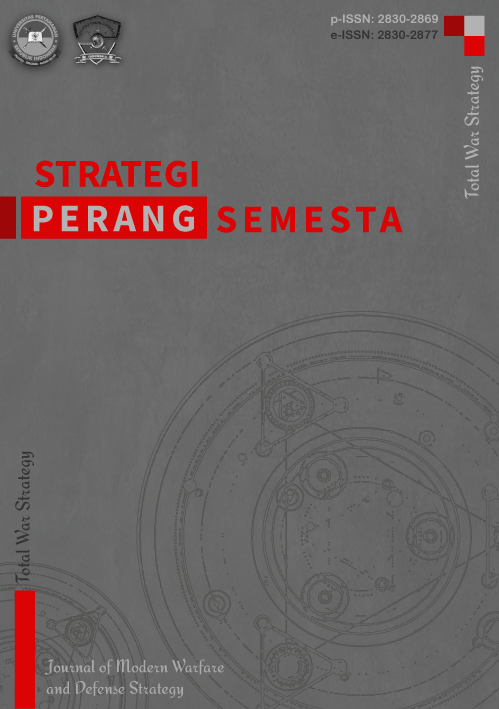Social media and its influencers: A study of Indonesian state-defending strategy in the 21st century
DOI:
https://doi.org/10.56555/sps.v8i2.1519Abstract
Globalization can be seen in almost every aspect of people's lives, especially in the influence of advances in information and communication technology, including the Internet, the emergence of various social media platforms, and the rise of social media influencers in society. With the active role of social media influencers and social media penetration among Indonesian people, the Indonesian government can take advantage of this phenomenon to strengthen strategic programs called State-Defending Program. The development of the state-defending program by the MoD to enhance national defense and character needs to adapt to technological developments. Social media can answer this challenge. By optimizing the functions of social media and influencers in supporting defense governance and state defense, the MoD, as the leading sector, needs to put forward new communication strategies and methods to expand the spectrum of influence for state-defending for all levels of society in Indonesia. Finally, this study aims to analyze the development of the state-defending program and its challenges, as well as the state-defending development strategy implemented by the Ministry of Defense through social media engagement.
References
Arif, M. (2021). Generasi millenial dalam internalisasi karakter Nusantara. IAIN Kediri Press. http://repository.iainkediri.ac.id/id/eprint/682%0Ahttp://repository.iainkediri.ac.id/682/1/GENERASI MILENIAL_moh arif.pdf
Baylis, J., Smith, S., & Owens, P. (2020). The Globalization of World Politics.
Chiş-Manolache, D., & Chiş, C. (2019). National defence - Its role and importance in ensuring the image of a stable state. Scientific Bulletin, 24(2), 108–116. https://doi.org/10.2478/bsaft-2019-0012
Efendi, A., Astuti, P. I., & Rahayu, N. T. (2017). Analisis pengaruh penggunaan media baru terhadap pola interaksi sosial anak di kabupaten sukoharjo. Jurnal Penelitian Humaniora, 18(2), 12–24. https://doi.org/10.23917/humaniora.v18i2.5188
Erwin, A. (2017). Nationalism in a Globalized Era. Westminster Journal for Global Progress. https://medium.com/westminster-journal/nationalism-in-a-globalized-era-15ae61904bcd
Flew, T., & Smith, R. (2018). New media: An introduction. Oxford University Press.
Giddens, A. (1990). The consequences of modernity. In Polity Press. Polity Press.
Infomiliter.com. (2022). Mengenal Sishankamrata, ciri-ciri dan alasan dibentuk. https://www.infomiliter.com/read/1072/mengenal-sishankamrata-ciriciri-dan-alasan-dibentuk/page=2
Inukonda, S. (2020). Media , nationalism and globalization. Routledge.
Kacowicz, A. M. (1998). Regionalization, globalization, and nationalism: Convergent, divergent, or overlapping? (No. 262; Issue December).
Kemhan RI. (2017). Bela negara dalam perspektif strategi dan kebijakan pertahanan negara. Wira Media Informasi Kementerian Pertahanan, 6.
Kemp, S. (2022). Digital 2022: Indonesia. Data Reportal. https://datareportal.com/reports/digital-2022-indonesia
Laksono, D. A. F. (2018). Media dan ketahanan bangsa. https://doi.org/https://www.kpi.go.id/index.php/id/umum/38-dalam-negeri/34349-media-dan-ketahanan-bangsa
Mahdia, A. (2018). Pengaruh konten influencer di media sosial terhadap kesejahteraan psikologis remaja akhir. Jurnal Psikologi, 11(2), 172–179. https://doi.org/10.35760/psi.2018.v11i2.2262
Ministry of Public Works and Public Housing. (2017). Social Media Influencer. https://bpsdm.pu.go.id/bacaartikel-social-media-influencer#sthash.nE7XuRux.Bzweu8E5.dpbs
Nepal, S., Paris, C., & Georgakopoulos, D. (2015). Social media for government: Theory and practice. Springer. https://doi.org/10.4324/9781315643564
Populix. (2022). Social media habit and internet safety. https://info.populix.co/report/social-media-habit-and-internet-safety-2/
Ryan, D. (2021). Understanding digital marketing: A complete guide to engaging customers and implementing successful digital campaigns (5th ed.). KoganPage.
Sobaci, M. Z. (2016). Social media and local governments: Theory and practice. Springer. https://doi.org/10.1007/978-3-319-17722-9_2
Statista. (2022). Countries with the largest digital populations in the world as of January 2022. https://www.statista.com/statistics/262966/number-of-internet-users-in-selected-countries/
Sugiyono. (2018). Metode penelitian kualitatif: Untuk penelitian yang bersifat eksploratif, enterpretif, interaktif, dan konstruktif. ALFABETA.
Supriyatno, M. (2014). Tentang Ilmu Pertahanan. Yayasan Pustaka Obor Indonesia.
Taprial, V., & Kanwar, P. (2012). Understanding social media.
Victoria, A. (2018). About national defence. ResearchGate, December. https://doi.org/10.13140/RG.2.2.24603.52004
Watie, E. D. S. (2011). Komunikasi dan media sosial. Jurnal The Messenger, 3(1), 69. https://doi.org/10.26623/themessenger.v3i2.270
wearesocial.com. (2022). Daily time spent using the internet. https://wearesocial.com/hk/blog/2022/04/more-than-5-billion-people-now-use-the-internet/
Widodo, S. (2011). Implementasi bela negara untuk mewujudkan nasionalisme. Jurnal Ilmiah CIVIS, Vol. 1, No(1), 18–31.
Downloads
Published
Issue
Section
License
Proposed Policy for Journals That Offer Open Access. Authors who publish with this journal agree to the following terms:
- Authors retain copyright and grant the journal right of first publication with the work simultaneously licensed under a Creative Commons Attribution License that allows others to share the work with an acknowledgment of the work's authorship and initial publication in this journal.
- Authors are able to enter into separate, additional contractual arrangements for the non-exclusive distribution of the journal's published version of the work (e.g., post it to an institutional repository or publish it in a book), with an acknowledgment of its initial publication in this journal.
- Authors are permitted and encouraged to post their work online (e.g., in institutional repositories or on their website) prior to and during the submission process, as it can lead to productive exchanges, as well as earlier and greater citation of published work (See The Effect of Open Access).
Proposed Policy for Journals That Offer Delayed Open Access. Authors who publish with this journal agree to the following terms:
- Authors retain copyright and grant the journal right of first publication, with the work [SPECIFY PERIOD OF TIME] after publication simultaneously licensed under a Creative Commons Attribution License that allows others to share the work with an acknowledgment of the work's authorship and initial publication in this journal.
- Authors are able to enter into separate, additional contractual arrangements for the non-exclusive distribution of the journal's published version of the work (e.g., post it to an institutional repository or publish it in a book), with an acknowledgment of its initial publication in this journal.

